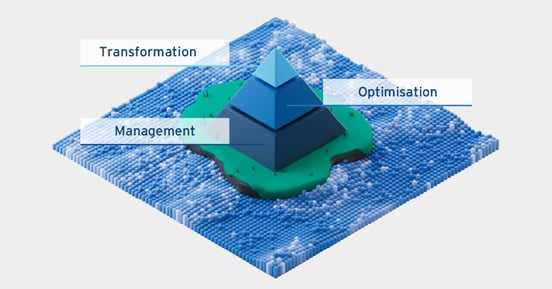Effective file room management can reduce business risks and improve productivity
Organizations with hard-copy documentation and decentralized storage can find workflow solutions.

Many organizations still keep hard-copy records due to aging legacy processes. However, many are also adopting a digital transformation strategy to end these legacy processes, saving costs and increasing productivity. See how Iron Mountain helped a national retailer with their digital transformation.
A major retailer with stores across North America recently found themselves in the middle of a records management quagmire. Human Resources records were kept onsite in decentralized file storage areas per store location and were managed by local staff who had little to no records management experience.
Onsite file rooms like these seem like a good way to store records, but these storage areas can actually make it more difficult to share information with others in your organization and protect information long-term.
Keeping all this paper onsite can also make it harder to digitize your records and increases your risk for inadvertent disclosure of Personal Identifiable Information (PII) – common to Human Resources (HR) records – and possible fines related to litigation if you kept files past their retention schedule or cannot find files linked to discovery request.
Moving these file rooms offsite to a trusted storage provider can not only reduce these business risks, but also enable employees to stay focused on their core roles and responsibilities instead of worrying about the management of records.
Let's take a closer look at a major multinational retail organization, who worked with Iron Mountain to move their file rooms offsite to secure, compliant Records Centers that was able to quickly boost productivity and lower bottom line costs.
A Records and Information Manager's Worst Nightmare
As mentioned, the large retailer's HR records were held on site in file rooms dispersed throughout North America. Complicating matters was an outdated, all-paper employee onboarding process that was a constant source of problems.
New employees had to fill out stacks of hard-copy forms required by federal and state regulations and by corporate policies. These records were held in the same locations where the employees worked, but there was not a trained records manager in each location.
This process created a disjointed workflow – there were manual-workflow bottlenecks and employees had to redo paperwork when records couldn't be found, resulting in lost productivity. It also made it difficult to:
- Find and share records when needed most by either corporate or by employees at the location
- Track personnel records to confirm completeness and regulatory compliance
- Ensure data privacy of all records
- Remain compliant with legal, regulatory and corporate records policies and retention schedules since there was confusion in each location on how to manage records
- Centralize records and move to a digital records system
- Respond to discovery requests in a timely manner
Moving Away From Onsite File Rooms While Retaining Access to Records
At first, the retailer's management didn't want to make changes to their aging workflow. They feared the cost of digitizing large volumes of legacy paper records and were leery of changing current processes due to concerns about lost productivity if the process changed too drastically for employees to absorb and manage going-forward.
Iron Mountain offered the retailer a hybrid solution that would help them:
- Clean out all their file rooms, currently spread out across North America, and move all records into one, central file room located in a secure, compliant Iron Mountain Records Center.
- Digitize and improve their HR process end-to-end using workflow automation technology provided by Iron Mountain's partner, Hyland Onbase.
All their paper records are now stored at Iron Mountain per their records policies and retention schedules and information about their entire inventory would be available online 24/7. If they needed a file back quickly, they can request it be imaged and available on-demand within 4-hours or they can request the physical record be returned within 24-hours.
Over 7 million records were moved offsite and on site file room space was converted to other business uses in many locations. Workflow changes decreased human-error when processing HR paperwork and greatly reduced the number of misplaced or lost files, which improved overall records compliance and data privacy for the retailer.
Management soon realized the security, chain of custody, data privacy, records and information management, and digital transformation benefits far outweighed their initial hesitation about the project.
Innovation without heartache
Maintaining paper records onsite in file rooms across a wide geographic area is counterproductive; it reduces employee productivity and introduces unnecessary audit, litigation and regulatory risk to your business. By moving file room operations offsite to a trusted storage provider can help you take the burden out of records management; accelerate digital transformation; and retain access to records throughout their entire lifecycle.
A major retailer with stores across North America recently found themselves in the middle of a records management quagmire. Human Resources records were kept onsite in decentralized file storage areas per store location and were managed by local staff who had little to no records management experience.
Onsite file rooms like these seem like a good way to store records, but these storage areas can actually make it more difficult to share information with others in your organization and protect information long-term.
Keeping all this paper onsite can also make it harder to digitize your records and increases your risk for inadvertent disclosure of Personal Identifiable Information (PII) – common to Human Resources (HR) records – and possible fines related to litigation if you kept files past their retention schedule or cannot find files linked to discovery request.
Moving these file rooms offsite to a trusted storage provider can not only reduce these business risks, but also enable employees to stay focused on their core roles and responsibilities instead of worrying about the management of records.
Let's take a closer look at a major multinational retail organization, who worked with Iron Mountain to move their file rooms offsite to secure, compliant Records Centers that was able to quickly boost productivity and lower bottom line costs.
A Records and Information Manager's Worst Nightmare
As mentioned, the large retailer's HR records were held on site in file rooms dispersed throughout North America. Complicating matters was an outdated, all-paper employee onboarding process that was a constant source of problems.
New employees had to fill out stacks of hard-copy forms required by federal and state regulations and by corporate policies. These records were held in the same locations where the employees worked, but there was not a trained records manager in each location.
This process created a disjointed workflow – there were manual-workflow bottlenecks and employees had to redo paperwork when records couldn't be found, resulting in lost productivity. It also made it difficult to:
- Find and share records when needed most by either corporate or by employees at the location
- Track personnel records to confirm completeness and regulatory compliance
- Ensure data privacy of all records
- Remain compliant with legal, regulatory and corporate records policies and retention schedules since there was confusion in each location on how to manage records
- Centralize records and move to a digital records system
- Respond to discovery requests in a timely manner
Moving Away From Onsite File Rooms While Retaining Access to Records
At first, the retailer's management didn't want to make changes to their aging workflow. They feared the cost of digitizing large volumes of legacy paper records and were leery of changing current processes due to concerns about lost productivity if the process changed too drastically for employees to absorb and manage going-forward.
Iron Mountain offered the retailer a hybrid solution that would help them:
- Clean out all their file rooms, currently spread out across North America, and move all records into one, central file room located in a secure, compliant Iron Mountain Records Center.
- Digitize and improve their HR process end-to-end using workflow automation technology provided by Iron Mountain's partner, Hyland Onbase.
All their paper records are now stored at Iron Mountain per their records policies and retention schedules and information about their entire inventory would be available online 24/7. If they needed a file back quickly, they can request it be imaged and available on-demand within 4-hours or they can request the physical record be returned within 24-hours.
Over 7 million records were moved offsite and on site file room space was converted to other business uses in many locations. Workflow changes decreased human-error when processing HR paperwork and greatly reduced the number of misplaced or lost files, which improved overall records compliance and data privacy for the retailer.
Management soon realized the security, chain of custody, data privacy, records and information management, and digital transformation benefits far outweighed their initial hesitation about the project.
Innovation without heartache
Maintaining paper records onsite in file rooms across a wide geographic area is counterproductive; it reduces employee productivity and introduces unnecessary audit, litigation and regulatory risk to your business. By moving file room operations offsite to a trusted storage provider can help you take the burden out of records management; accelerate digital transformation; and retain access to records throughout their entire lifecycle.
Related resources
View More Resources
Welcome to Iron Mountain’s Smart Sort centre of excellence
 Premium
PremiumData governance vs. information governance - closing the gap
